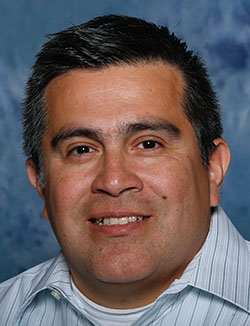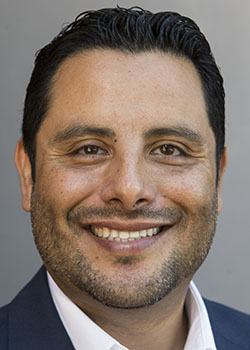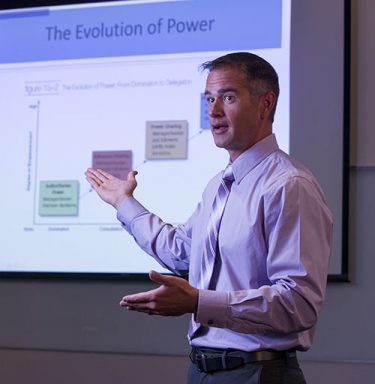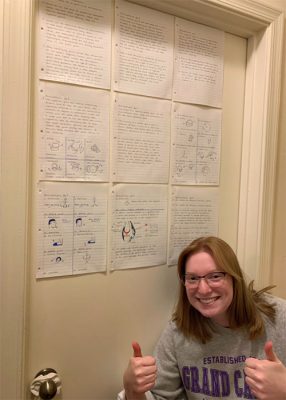
By Rick Vacek
GCU News Bureau
For the students, it was so easy. All they had to do was turn on their computer and click on the link. Just like that, they were in Dr. Enrique Lopezlira’s International Economics advanced class Monday morning via Zoom.
But for Lopezlira, like so many other Grand Canyon University professors and instructors, transitioning ground classes to an online environment involved much more than just turning on a computer.

And yet they made it work seamlessly on the first day of their new setup, necessitated when the coronavirus (COVID-19) forced students off campus and into their homes for the remainder of the semester. While GCU’s online expertise makes it well-equipped for such a major endeavor, the sudden change still required some instructional ingenuity.
Lopezlira, for example, had never taught an online class in his 15 years in academia, and he had been part of Zoom conference calls but had never managed one himself. That meant he had to practice at home (of course – where else would anyone be these days?) with his wife and daughter as the “students.”
He wanted to be ready for anything, so he told his wife to push every button on the computer. Pretty soon, she was pushing all of his buttons.
“I was drawing a graph and suddenly there were scribbles on the screen,” he said.
But it was good that she did that because it made him realize that he needed to mute the students and disable their ability to write on the screen. He could pause the lecture and invite their questions at intervals.
“I thought it was better to have the chat rather than having a lot of students talking at the same time,” he said.
Then the class started at 8:30 Monday morning, with Lopezlira in his office and students out yonder in the virtual world.

“Welcome to the new normal, I guess,” Lopezlira began.
But the new normal just flowed, as if the students were sitting right there with him. Lopezlira wrote on the screen (see photo), needlessly apologizing for his penmanship, and lectured about the circular flow model of an economy.
“As you know, my handwriting is terrible,” he told the students, “but it’s even harder on this iPad whiteboard.”
His assessment afterward:
“It went better than I thought it would. Students seemed to log in with no problem, and they asked good questions for the most part. …
“I was surprised how smooth it was – I was a little worried. I’m a lot more optimistic after today.”

Other Colangelo College of Business instructors reported similar results to the college’s dean, Dr. Randy Gibb, and shared some interesting ideas.
Eduardo Borquez was asked how the interaction of students went:
“Excellent!” he wrote. “Students came to class prepared and knowing what is expected of them based on the guideline I outlined and communicated via Announcements. They were happy to see their classmates and were catching up prior to the start of class – I open the virtual classroom 15-minutes before.”
Some of the responses he got:
“This is awesome.”
"So cool, I get to see everyone.”
“I am learning the same in the comfort of my home -- thank you for everything, Professor B.!”
"I noticed students still engaged and ready to learn despite everything happening around them," he said. "I did not see any disappointment, but rather happy individuals because they were back in school, safe in their home and eager to learn."
Mindy Weinstein also wrote that the interaction was good (“Students are responding to the discussion questions with thorough posts”) and shared these best practices:

“I pre-recorded my video lectures and embedded the discussion questions so that I ensure students watch the videos. Also, I am hosting an optional weekly ‘check-in’ with students via Zoom to answer questions, discuss current material, etc.”
Ed Slover’s assessment was that it’s all in the preparation. He estimates that he spent at least 2-3 hours per day during spring break “to get everything set up so it would be as seamless as possible.”
That included Loom lectures, weekly to-do lists and class announcements.
“I wanted to knock out the administrative side to prepare for contingencies,” he said. “(Faculty members) all were looking forward to spring break to decompress, but in terms of timing, spring break was incredibly helpful.”
And just as the virus has created impromptu family reunions, it has brought together GCU faculty and staff in new ways. Slover said he has talked to his program chair, Dr. Moronke Oke, more than ever by phone the last few days, “but of course that’s because we normally see each other.”
She schooled him and other instructors about a LoudCloud assessment feature that he never knew existed, which tracks with what has been happening in the college throughout the transition.
“I’d say overall the morale of CCOB is really, really good,” Slover said. “Yesterday there was an email chain of people sharing photos from home – lots of dog photos. The support of Dr. Gibb and the CCOB leadership has been outstanding.”
Said Gibb, “I am so proud of our CCOB team and to be part of GCU. We have the technological infrastructure for a smooth and successful transition, but more importantly we have the student-centric culture that allows our instructors to connect with their classes on a personal level. It is the rapport established between our teachers and students that allows the learning to continue.”

There were other innovations across campus and in students' homes as the online classes started.
College of Science, Engineering and Technology instructor Dr. Mark Wireman received this in an email from a student (see photo): "Whenever I finish copying a page of the review guide I put them on my door so my whole family can learn about anatomy! I just finished review guide eight and this is what my door looks like."
Alison King started her digital advertising class in the College of Fine Arts and Production by asking students what they had been doing so far to keep themselves busy with social distancing over break.
“Cuddling with my dog,” one student wrote in the class chat.
“Spending time with loved ones and going on walks,” another wrote.
“To maintain sanity, prayer is key and rest is key,” yet another shared. He told the chat he had spent his break “reading a lot of Scripture and meditating on God’s promises.”
It was not your typical “first day back” banter, but it made for a surprisingly smooth transition into the first topic: email blasts sent out by companies in responses to COVID-19. She challenged her students to create a sample draft of what they think should go in an email blast.
Students flooded the chat with ideas of how their businesses would make adjustments to address the pandemic. Some said they would limit their restaurants to takeout or drive through only, while others said they would reschedule public events until a safer time.
The 40-minute session concluded with a video.
But maybe the most appreciated innovation was one that a student addressed in a tweet:
“My professor is on a green screen, and the background is a GCU classroom so he can make us feel like we’re still in class.”
The new normal, indeed.
Staff writer Ashlee Larrison contributed to this story.
Contact Rick Vacek at (602) 639-8203 or [email protected].
****
Related content:



































































